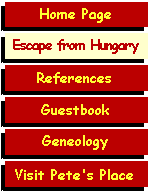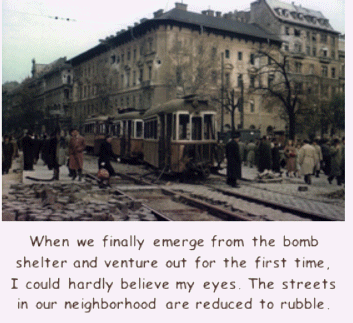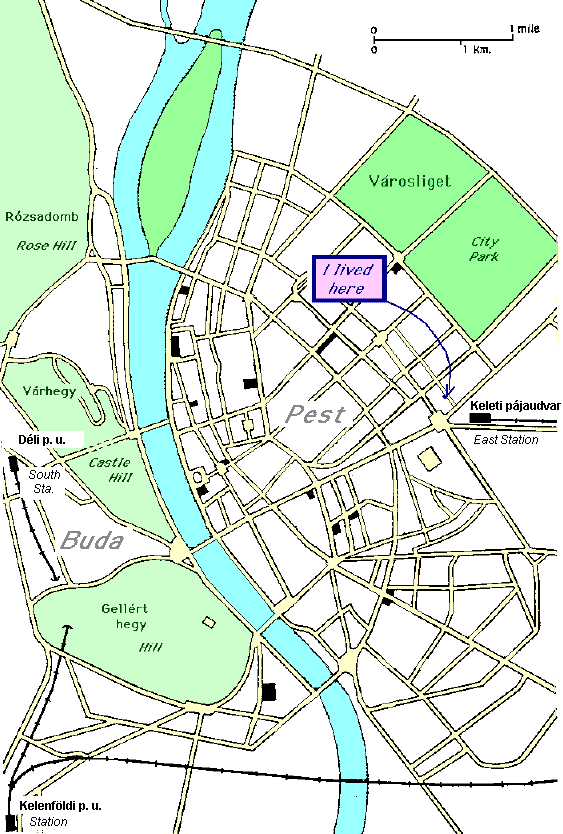![]()

 I.
Budapest, 1956
I.
Budapest, 1956
Tuesday, October 23, 1956
There is talk in school today about a demonstration that is going on downtown. Being a third grader, I don't really understand what is going on. When I arrive home, I see the adults in our apartment building huddling around radios trying to piece together the conflicting news. They are even listening to Radio Free Europe and other forbidden foreign stations!
I live with my mother and grandparents (grandmother and step-grandfather) near the Keleti pájaudvar (East Station), on Nefelejts utca, number 18. Click here to read more about my life before the revolution and visit my former home. My mother works by day as a draftsman for an industrial architecture office and takes night classes at a technical school. As usual, she is at school tonight, and will be home late. My grandparents are naturally getting worried, since the local radio is reporting some violence near the radio station. She finally arrives home and tells us about the bands of demonstrators she passed on her way home who bragged gleefully about toppling the statue of Josef Stalin which stood at the entrance to the Városliget (City Park). There is great excitement and apprehension.
Wednesday, October 24 - Saturday, November 3, 1956
The freedom fighters are on their way to defeating the Soviet military and the latter is preparing to leave Hungary. This is being well covered in the news media around the world. (Please refer to the bibliography.in the Reference page) Great euphoria is engulfing the city, with lots of political talk which I do not understand. Wherever I go, people hover over their radios when they are not talking politics. By November 3, it appears that Hungary would finally be rid of the Soviet curse. They are negotiating their withdrawal with the newly formed provisional government.
Sunday, November 4 - Friday, November 9, 1956
Well, the Soviets decided they were not leaving after all. In fact, more tanks and troops are pouring in than were present at the height of the German occupation in World War II. The Soviets' negotiation of withdrawal turns out to be a cruel ruse, typical of their tactics throughout the Cold War. Column after column of troops, tanks and heavy artillery is entering the city from the east and are securing all the vital centers. The largest cannons are being erected on Gellérthegy (Gellert Hill - see map below) and are now pounding the entire city. The shelling is so fierce in our neighborhood that we must leave our apartment and hunker down in the bomb shelter beneath our building.
It is a tense, heartbreaking time, not to mention cold and damp as well. Again, everyone is huddled around the one short wave radio, listening for any glimmer of hope. There is the incessant urging by Radio Free Europe to fight on, victory is within grasp. Then there is the repeated, desperate appeals to the U.N. for intervention, but none is forthcoming. How can a lightly armed scrappy group of teenagers and young adults defeat an entire mechanized Soviet division?
I vividly remember hearing the clatter of tank tracks overhead, the exploding shells, the rumble of disintegrating brick and mortar. This is punctuated by the frequent rattle of machine gun fire with the occasional pop of small arms fire. There are even freedom fighters on the roof of our building, firing their puny rifles at the Soviet tanks. People would venture out during the lulls to bring back cigarettes and eyewitness accounts of the damage to the city.
Saturday, November 10 - Saturday, December 29, 1956
When we finally emerge from the bomb shelter and venture out for the first time, I could not believe my eyes. The streets in our neighborhood are reduced to rubble! Large, 3 - 4 story brick and stone buildings have their entire facades ripped out, exposing their inner walls with pictures still hanging, albeit crooked; doors dangling from their frames, half open; occasionally, a bit of flooring still intact near the walls and corners, sometimes with a chair or couch still standing on it. On the ground below lies the contents of the blown out rooms in a mountain of mortar and dust. I especially recall seeing a grand piano resting on its side, just sticking out of the rubble. Huddled around this wreckage are the families who once resided there, crying, as they watch their worldly possessions in ruins. Miraculously, our building is not severely damaged; it just sports a few more bullet holes. This building survived two world wars and is not quite ready to succumb to a mere revolution.
The streets are virtually impassable due to the burned out carcasses of trucks, busses and trolleys. People are gingerly stepping over the electrical cables which are strewn about, lest they still be live. We walk to other neighborhoods, less damaged than ours, to buy whatever scarce supplies are available. During this ordeal, though, we never go to bed hungry.
In school, there is no talk of the revolution. I'm not sure if we are allowed to talk about it or not, but we are just too scared to even mention it. The teachers are probably scared, too, and I am sure that they are not happy with the latest turn of events. Everyone is afraid of the Soviets and their despicable henchmen, the Hungarian AVO, the secret police.
During this period, there is widespread talk of escape. I am told, in no uncertain terms, not to mention this to anyone. Again, no one is talking about it in school, but every day we seem to be missing another classmate or two. "They moved to the country, where there is more food" we are told. Of course, in our heart of hearts we know the truth - they moved out of the country, where there is more freedom! While the Soviets are consolidating their power in the cities, the borders are left loosely patrolled, which is presenting a rare opportunity for the dejected Hungarians to escape.
My mother and grandparents spend many a late night doing some serious talking. I know the topic is escape. My mom's best friend is one of the first to go; she escapes in mid-November with her husband and baby. Just before Christmas a letter arrives from Toronto, Canada -- they had made it safely! Would we be next?
 Click for detailed map of Budapest |
Chapter II -- The Trek
|